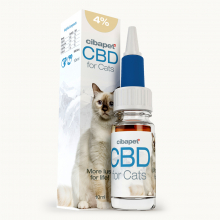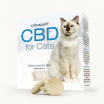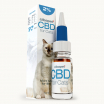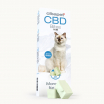Will CBD Make My Cat Less Aggressive?
Published:
Is your furry feline friend displaying aggressive behavior that is out of character? Does kitty seem more irritable and quick to attack? While aggression in cats can stem from various causes, CBD may be an effective option to calm kitty's mood and curb aggressive tendencies.
Contents:
- What Causes Aggression in Cats?
- How Does CBD Work?
- Will CBD Make My Cat Less Aggressive?
- CBD Oil vs CBD Pet Treats for Cats
- How Much CBD Should I Give My Cat?
- Are There Side Effects of CBD for Cats?
- Tips for Giving a Cat CBD Oil & Treats
- What to Look for in CBD Products for Cats
- Other Ways to Curb Cat Aggression
- Should I Speak with My Vet Before Using CBD for My Cat?
- The Takeaway: Can CBD Calm an Aggressive Cat?
- Frequently Asked Questions About Using CBD for Cat Aggression
- What types of aggression respond best to CBD?
- What’s the difference between CBD and THC for cats?
- Are CBD treats or oils better for cats?
- What’s the optimal dosage for a 10 lb cat?
- How long does it take for CBD to reduce aggression?
- Are there potential side effects?
- Can CBD interact with other medications?
- What signs indicate CBD may not be working?
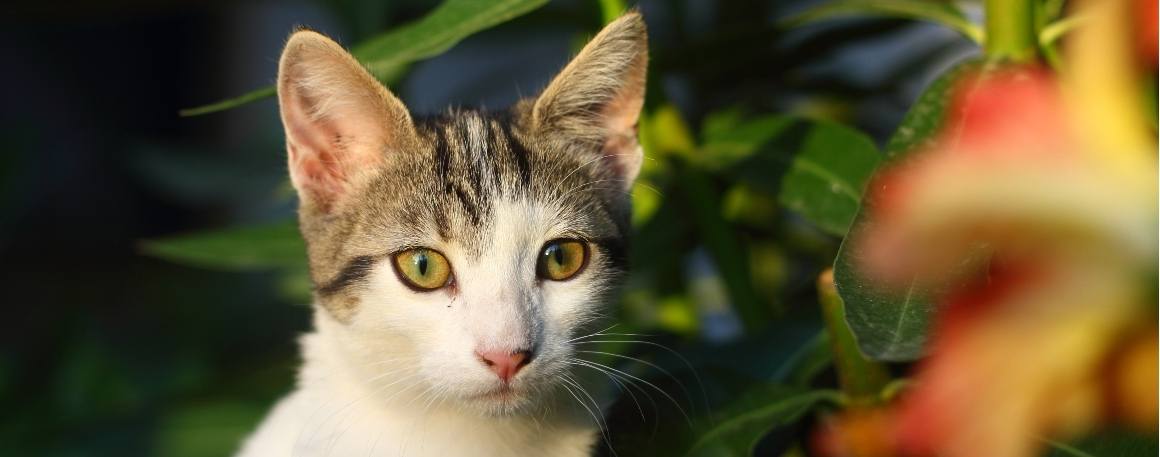
CBD, also known as cannabidiol, is a compound derived from the cannabis plant that does not induce psychoactive effects. Instead, CBD interacts with the endocannabinoid system to produce therapeutic benefits without the “high” caused by THC.
Research indicates CBD can reduce anxiety, alleviate pain, improve sleep, and more. But what about for our feline companions? Can CBD help make cats less aggressive too?
What Causes Aggression in Cats?
Aggression in cats often stems from fear, anxiety, pain, or frustration. Common triggers include:
- Fear of strangers or unfamiliar environments
- Stress from changes in routine or housing
- Pain from injury, arthritis, dental issues
- Frustration from lack of socialization, activity, or territory issues
Pain and illness are frequent instigators of aggression. Cats instinctively mask symptoms, so sudden behavior changes like lashing out warrant a veterinary exam to check for underlying medical problems.
How Does CBD Work?
CBD interacts with the endocannabinoid system (ECS) - a complex network of receptors and neurotransmitters that help regulate physiological processes like mood, pain perception, memory, appetite, sleep, and more.
While research on CBD for cats is limited, studies show it acts on CB1 and CB2 receptors in the ECS to influence serotonin and GABA levels in the brain. This helps reduce anxiety, fear, and stress while lifting mood.
CBD may also minimize pain and inflammation by inhibiting COX-2 enzymes and interacting with TRPV1 pain receptors and glycine receptors involved in sensory perception.
So by targeting receptors involved with mood, pain, and perception, CBD can alleviate common aggression triggers in cats.
Will CBD Make My Cat Less Aggressive?
While more studies are needed, initial research and anecdotal evidence suggest CBD can curb aggression by reducing anxiety, fear, stress, and discomfort that often prompt aggressive outbursts.
Specifically, CBD may help aggressive cats by:
1. Reducing Anxiety & Stress
Cats are often aggressive when feeling anxious or stressed. By increasing serotonin and GABA levels in the brain, CBD generates anti-anxiety and calming effects that can make cats less reactive.
In one study, CBD reduced stress behaviors and improved sociability in cats during transport - a known stressor.
2. Alleviating Pain & Discomfort
Cats often bite or scratch when in pain. By inhibiting inflammatory enzymes and interacting with pain receptors, CBD can minimize discomfort that leads to aggression.
Research shows CBD reduces pain and joint inflammation in arthritic dogs. Similar effects are likely in cats.
3. Easing Frustration & Irritability
Restricted movement, lack of stimulation, and territory disputes can frustrate cats and cause reactive behavior. CBD’s anti-anxiety properties help cats cope better with frustrating circumstances to prevent aggressive responses.
While individual results will vary, CBD shows promise in reducing common triggers for feline aggression. Always chat with your veterinarian before trying CBD with your cat.
CBD Oil vs CBD Pet Treats for Cats
CBD is available for cats as oils/tinctures, treats, capsules, or topical balms. Oils provide versatility in dosing, while treats offer ease of use.
CBD oils allow flexibility in administering doses. Drop the oil directly into your cat's mouth or mix with food. Oils also enable customization of potency.
CBD cat treats provide a convenient way to give CBD, with set doses in pet-friendly flavors. However, it can be trickier to control the exact amount consumed.
Ultimately, choose the CBD format your cat will best tolerate. You may need to experiment to find their favorite.
How Much CBD Should I Give My Cat?
Proper dosing is imperative when using CBD for cats. Factors like your cat’s weight, the CBD concentration, and delivery method impact suitable dosage.
There are no official dosing guidelines for cats yet. However, a general rule is 0.1-0.5 mg of CBD per kilogram of body weight twice daily. Start on the low end first.
For example, a 10 lb cat weighs around 4.5 kg. So a starting dose would be 0.45 mg - 1.25 mg of CBD twice a day.
Increase gradually if needed, monitoring for desired effects and side effects. Work closely with your vet to find the optimal dosage for your cat.
Are There Side Effects of CBD for Cats?
CBD is generally well-tolerated in cats, especially when used correctly under veterinary guidance. Mild effects may include:
- Drowsiness or lethargy
- Temporary drop in blood pressure
- Dry mouth
Rarely, high doses may cause vomiting or diarrhea. Always monitor your cat after introducing CBD and adjust the dose accordingly.
Never give THC products, which can be toxic for cats. Also avoid CBD drugs containing grapeseed oil, xylitol, or other potentially harmful additives. Work with a reputable source and your veterinarian for safe CBD recommendations.
Tips for Giving a Cat CBD Oil & Treats
Here are some tips for success in administering CBD to cats:
- Go slow - start with a low dose and increase gradually if needed
- Disguise the taste - mix oils into wet food or use strong flavored treats
- Limit chase/struggle - burrito wrap your cat in a towel for easier dosing
- Reward cooperation - team CBD with a tasty treat or catnip as positive reinforcement
- Be consistent - stick to regular times and methods for administering CBD
- Track effects - keep notes on dose given and behavioral responses
What to Look for in CBD Products for Cats
With the booming CBD market, discerning quality products is crucial. Seek CBD sourced from organic hemp and extracted safely without harsh chemicals.
Also verify the formula:
- Contains pure CBD isolate without THC
- Has a certificate of analysis confirming potency and purity
- Is made specifically for pets with suitable flavoring
- Comes from a reputable company with transparency on manufacturing
Work closely with your veterinarian and consult pet CBD reviews to select a high quality product.
Other Ways to Curb Cat Aggression
While CBD oil and treats may help reduce aggression, also implement additional techniques to address the root causes:
If fear/anxiety-driven:
- Use synthetic feline pheromones to induce calm
- Provide secure hiding spots and vertical territory
- Introduce socialization and visitors gradually
If stemming from pain/illness:
- Schedule a veterinary exam to diagnose and treat any discomfort
- Ask about prescription pain or anti-anxiety medications
If due to stress triggers:
- Maintain consistent routines for feeding, play, litter box, etc.
- Limit environmental changes when possible
- Ensure adequate territory and resources
If frustration/boredom-induced:
- Increase daily playtime and interactive toys
- Provide puzzle feeders or food dispensing toys
- Consider leash training for supervised outdoor time
A multi-pronged approach combining CBD with additional behavior and environmental strategies will offer the greatest success in curbing feline aggression.
Should I Speak with My Vet Before Using CBD for My Cat?
It is highly advisable to discuss using CBD with your veterinarian first. This ensures proper precautions and dosing to maximize benefits while avoiding potential harm.
Be prepared to provide details on:
- What aggression symptoms your cat exhibits
- When aggression issues began and potential causes
- Your cat’s full medical history
- Any medications/supplements your cat takes
Your vet can help determine if CBD is appropriate and may recommend further diagnostics if an underlying condition could be causing aggressive behavior. They can also highlight any possible drug interactions with CBD.
With veterinary guidance, CBD may be a helpful addition to safely manage unwanted aggression in cats. But other approaches may be needed as well for full resolution of symptoms.
The Takeaway: Can CBD Calm an Aggressive Cat?
While more studies are warranted, current evidence suggests CBD may help reduce anxiety, discomfort, and other aggression triggers in cats. Its anti-inflammatory and calming properties show promise for alleviating the root causes of irritable behavior.
When sourced safely and used as directed under veterinary supervision, CBD oils, treats, or capsules may help an aggressive cat. However, optimal results require addressing any medical issues while also modifying environmental stressors.
By reducing fear, stress, frustration, and pain, CBD can restore calm and curb reactive aggression to help return cats to their usual friendly selves. But have patience - it may take trials and fine-tuning to see satisfying results.
Ultimately, each cat responds differently to CBD. Work closely with your veterinarian to determine if it’s an appropriate option along with other behavioral therapies to smoothly resolve aggression issues in your feline friend.
Frequently Asked Questions About Using CBD for Cat Aggression
CBD shows promise in reducing anxious or aggressive behavior in cats. But many owners still have questions. Here we answer some frequently asked questions about using CBD to curb feline aggression.
What types of aggression respond best to CBD?
CBD may work best for fear-based or anxiety-driven aggression. It helps minimize the stress, noise phobias, or insecurity triggering reactive behavior. CBD is also useful for discomfort-induced aggression by reducing pain and inflammation. However, it may be less effective for aggression stemming from lack of training or predation instincts.
What’s the difference between CBD and THC for cats?
CBD is non-psychoactive and does not produce a “high”. THC is the cannabis compound responsible for intoxication and is toxic for cats. Always choose CBD products made just from hemp, not marijuana, to avoid THC dangers.
Are CBD treats or oils better for cats?
Both have pros and cons. Oils allow more precise dosing but can be messier to give. Treats are easier to administer but provide less dosage control. Try both to see which your cat tolerates best. Flavored oils or strong tasting treats can make CBD more palatable.
What’s the optimal dosage for a 10 lb cat?
A typical starting dose is 0.25 mg – 0.5 mg of CBD per kg of body weight twice daily. For a 10 lb cat that’s around 0.45 – 0.9 mg of CBD twice per day. Dosage needs may vary based on factors like age, health status, and aggressiveness of symptoms. Work with your vet to fine-tune an effective dosage for your cat.
How long does it take for CBD to reduce aggression?
Improvements are often noticed within a week but can take 2 – 4 weeks for full effect. Find your cat’s minimal effective dose and administer it consistently. Keep notes on behavioral changes to help gauge effectiveness. Discontinue use if no improvement after a month.
Are there potential side effects?
CBD is generally very safe but can cause lethargy, vomiting or diarrhea at high doses. Start with low doses and monitor your cat closely. Seek immediate vet care if side effects concern you. Never give THC products and consult your vet on CBD safety.
Can CBD interact with other medications?
CBD can potentially interact with some drugs metabolized through the liver. Tell your vet about any medications your cat takes so they can advise you on any possible CBD interactions or caution needed. Full disclosure ensures CBD is used safely.
What signs indicate CBD may not be working?
If aggression symptoms don’t begin improving within 4-6 weeks, CBD may not be effective. Also watch for signs like worsened aggression, extreme sedation, lack of appetite, or other concerning health changes that warrant discontinuing CBD and following up promptly with your vet.
We hope these tips help you use CBD safely and effectively to curb your cat’s aggressive behavior. Always consult your veterinarian before starting CBD to ensure appropriateness and proper usage. With professional guidance, CBD can be a valuable tool in promoting harmony and comfort for both you and your feline friend.









